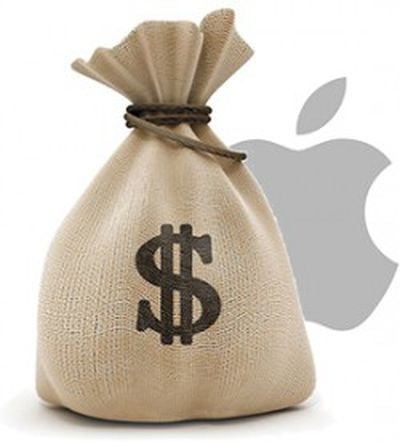 Confirming rumors reported last week, Apple on Monday issued a U.S. dollar bond in Taiwan that is estimated to raise between $1 billion and $1.2 billion (via Reuters).
Confirming rumors reported last week, Apple on Monday issued a U.S. dollar bond in Taiwan that is estimated to raise between $1 billion and $1.2 billion (via Reuters).
The yield on the 30-year bond compares with a range between 4.2 percent and 4.3 percent ahead of its pricing, according to people familiar with the matter.
That yield comes in significantly lower than recent bonds by blue-chip multinationals such as Intel and Anheuser Busch InBev, but it is only the first issue of debt by Apple on the island, which is home to a number of the company's partners in the supply chain.
The total amount raised by the bond, which is callable after the second year, has yet to be finalized, said sources who spoke to Reuters and could not be named.
Cathay Financial Holding, the parent company of Taiwan's biggest life insurer, has reportedly bought a "small part" of the bond, since the yield is lower than others issued by Apple outside of Taiwan.
Apple has a large offshore cash pile and the company clearly sees debt markets as a viable way of financing its capital return program, which was recently increased to $250 billion following a $50 billion expansion in April. Apple is also said to be issuing bonds in Australia, and possibly Japan and Singapore, as part of broader plans to raise up to $4 billion in debt in the Asia-Pacific region.























Top Rated Comments
Apple has, for example, $10 billion in cash. They pay, for example, 10% tax on that per year. (Numbers are made up)
Apple's tax bill : $1 billion per year.
Apple then borrows $5 billion, by issuing a bond (a request to borrow money with a promise to repay.) The interest on that is, say, 20% per year. Apple has to pay out another $1 billion per year.
You may think the total for Apple to pay out is now $2 billion per year. Not so.
Most governments say if a company borrows money to pay for something, then the interest payments are a cost of running the company. So then governments (mostly) chose to allow companies to deduct (some of) that cost of running the company from (some) of the taxes they must pay the government.
Apple now deducts that $1billion in interest payment from the $1billion in taxes they owe.
Result: Apple has gone from $10 billion in cash to $15 billion in cash, and still only pays $1billion per year. ($0 in taxes, and $1 billion in interest payments).
Why is this allowed?
The benefit to government in allowing this kind of deal is that, in theory, the $5 billion raised is spent with other companies, increasing their profits and creating more jobs. The government then gets their $1billion back in taxes on the other companies' profits, plus economic stimulus, plus reduced unemployment, plus increased sales taxes, plus more revenue from the personal taxes that employed people pay. Etc.
That's the best ELI5 I can do. Am I on the right track here?
http://www.accountingtools.com/questions-and-answers/what-is-a-tax-shield.html
Notice that the money raised is in USD? Apple can likely bring that money back into the US with minimal tax impact. Apple's problem is that they can't bring capital back into the US without significant taxation. So... issue debt overseas in USD. Bring the raised capital back to the US. Pay the debt with capital that's overseas that you can't easily bring home.
That the debt is callable in two years supports this idea.